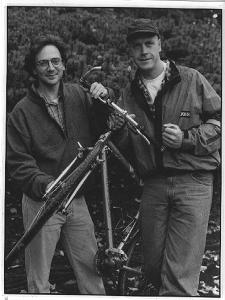
photo by Peggy McKenna
Along with their "BikeAbout" colleagues, Ethan Gelber, left, and Anthony Ziehmke undertook a bicycle circumnavigation of the Mediterranean that encompassed 24 countries.

From The Waldo Independent, October 8, 1998. Reproduced with their permission.
by Glenn Montgomery
It was a trek that combined one of the most elemental forms of transportation with some of the latest advances in communication. Equipped with Compaq Presario laptop computers as well as digital cameras, Ethan Gelber and colleagues spent nine months on a bike circumnavigating Mediterranean countries and sharing their experiences via the Internet with students everywhere.
 photo by Peggy McKenna Along with their "BikeAbout" colleagues, Ethan Gelber, left, and Anthony Ziehmke undertook a bicycle circumnavigation of the Mediterranean that encompassed 24 countries. |
The 32-year-old Gelber, who has ties to Morrill, has been back in Maine talking to school groups about his experiences on his "BikeAbout" trip that started on the northern coast of Morocco last September and culminated 6,528 miles and 24 countries later on June 30 in Gibraltar.
Along with three other Americans and one Austrian, Gelber climbed aboard a Wheeler hybrid touring bike on Sept. 25, 1997, on the Moroccan coast for the two-wheel voyage. The five volunteers on the nonprofit BikeAbout trip gathered information on each country whose boundary they wheeled across, sharing that knowledge to promote cross-cultural understanding, tolerance and peaceful coexistence.
Gelber was the BikeAbout organizer, but he was not born in the bike saddle. "I didn't actually learn to ride a bike until I was 12 or 13," says the New York native whose Manhattan-based family didn't have much need for that kind of transportation in such an urban environment.
Gelber got into biking in a big way, though, doing an American Youth Hostel-sponsored trip to the Pennsylvania Dutch Country in his early teens. Then the summer after his freshman year in high school at Stuyvesant in New York, he pedaled solo from Springfield, Mass., to Morrill during a month-long jaunt.
Morrill was a natural summer destination, for it was there that Blanche and Samuel Gelber had been bringing their family for years for the warm vacation months. "They bought a house the same year I was born," says Ethan, who when he reached school age actually spent some time in classrooms here. His father was a college art professor, and when the university session was completed in the spring, the family would pack up and depart their residence on the upper west side of Manhattan, Gelber wold finish the school term in Waldo County. He attended classes in Belmont as a first and second grader and in Morrill for the third and fourth grades.
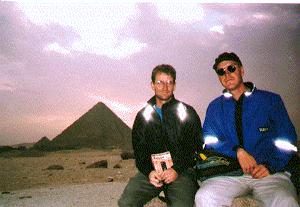 Bike riders Anthony Ziehmke, right, and Padraic Kennedy in Egypt. |
With his ties to Maine, it was in this state that Gelber made his first go-round of public appearance talking about his trip. He has visited with elementary school children and given a presentation at Unity College.
The trip that spanned 281 days of travel in north Africa, the Middle East and southern Europe had its inception in a Mexican restaurant in New York City about four years ago. Gelber was dining with friends and the group discussion veered toward the dreams that each harbored about things they'd like to do during their physically active years. It was not Gelber but one of his friends who expressed a desire to travel through all the countries of the Mediterranean. "The idea really stuck with me," says Gelber. "I had a dream about it that night."
Gelber had good reason to be intrigued by the concept. In truth, he knew the Mediterranean region even better than the vast expanses of his home country. Off and on since 1988, Gelber led bike tours for English-speaking groups in the Mediterranean area under the auspices of the Paris-based Blue Marble Travel group. Ideas began to percolate in Gelber's mind, and out of that grew the concept for the trip that would combine the joys of a Mediterranean cycle trip with Gelber's interest in youth education and promoting cross-cultural understanding.
The idea was for a small group of cyclists to travel from one Mediterranean country to another, timing their journey to mirror the nine-month school year. The group would meet with school children along the way, gathering data for the cycling group to transmit to other school kids via the Internet.
Gelber, who at the time was pursuing a masters in international education at Columbia University while teaching at an alternative high school in New York, embarked upon a letter-writing campaign to raise money for the bike trip. "It was a really, really slow crawl," he says of the pace the donations came in.
A big break for Gelber came when he received a large donation from the Foundation for the Progress of Humanity, a Franco-Swiss group. Monies came in from an international network, the Alliance for a Responsible and United World, and Gelber got a sponsorship from the United Nations. The Wheeler company donated the use of five bicycles and Compaq the use of five laptop computers. Simon and Schuster's Computer Curriculum Corporation offered to design a program that would allow U.S. students to access the BikeAbout info.
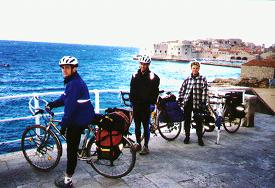 Cyclists, from left, Ethan Gelber, Padraic Kennedy and Corinne Whitney on the Croatian coast. |
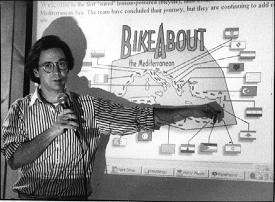 photo by Peggy McKenna Gelber, the BikeAbout organizer, was at Unity College Friday talking about the 6,528-mile bike trip that began Sept. 25, 1997, on the northern coast of Morocco and culminated 281 days later at Gibraltar. |
Daedalus Design Group's Elizabeth Guffey of Yarmouth, a Yale classmate of Gelber's, designed a web site for BikeAbout. "There was a team of five on the road, but we were a team of six. Elizabeth was fundamental to the success of the project," says Gelber.
After two-and-a-half years, Gelber raised $30,000, not even half of the $80,000 needed to keep five people on the road for nine months. "We took a gamble and left anyway," says Gelber, whose group hoped that publicity along the way would lead to increased interest and further donations.
Along with organizer Gelber, among those strapping on bike helmets last September for the start of the trip were two men who had also been bike tour guides for Blue Marble - Anthony Ziehmke of New York City and Padraic Kennedy of Arkansas. Gelber met Andrea Siegl of Graz, Austria, at an international conference in Spain and she joined on, as did her friend Corinne Whitney of Milwaukee.
The five departed from the town of Ceuta. Though that community is on the Moroccan coast, it is actually a part of Spain. At the outset, each biker carries between 40 and 60 pounds of gear, utilizing trailers they towed behind their two-wheelers to transport some of the items, including laptops in hard cases enclosed in rainproof bags.
The bike troupe headed across the north African coast, traveled up the Middle Eastern side, and then returned through Turkey and the southern European countries. Along the way, they stopped to talk with the citizenry, targeting students. "Our mission was to reach out to students around the Mediterranean, to learn from them about their culture, their history, their food, their likes and dislikes, and their hopes for the future," says Gelber.
Bike members organized the info and typed it into the computer, sending it by modem to the BikeAbout web site, where it could be accessed by students in other countries. For each nation, students also had at their fingertips a compendium of basic information about geographic location, size, population and other data. The bikers used a travelogue format to share information on their activities for the day. On a rotating basis, one of the five would responsible for the day's report, focusing on a person, a place, a food, and a word associated with the locale the group found themselves in.
Lots of tidbits were available to web site browsers, including the number of flat tires and broken spokes. Students could also note that on Oct. 26 last year when the bike group was in Sousse on the coast of Tunisia, at 6 p.m. the weather was a sunny 85 degrees. Sunrise was at 6:30 a.m. and the sunset was at 5:27 p.m. The food of the day was crepes aux fruits and crepes au fromage. The bikers covered 68 miles that day, bringing their trip total to 766.
Among the bits of whimsy thrown in for good measure was the number of olives consumed by the five. Olives are a universal food throughout the Mediterranean, so the group thought it would be fun to keep a running tally. By trip's end, some 2,557 had been ingested, almost all of them by the only real olive lovers in the bunch, Gelber and Ziehmke.
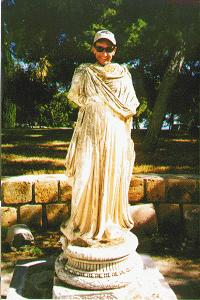 BikeAbout rider Padraic Kennedy during a light-hearted moment while sightseeing in Tunisia where the ancient city of Carthage once stood. |
Modern technology allowed the BikeAbout group to offer students information in more than just narrative form. Digital cameras were used to transmit photos, and an audio component meant that kids in America could hear firsthand the sounds of traffic in Cairo or the call to prayer for Muslims.
The five foreigners bearing laptops and the digital cameras attracted a lot of local attention when they stopped, especially in the north African countries such as Morocco. "We'd instantly be surrounded by people. It didn't matter if you were in the middle of what you thought was an empty field," remembers Ziehmke.
Though they always had a roof over their heads at night, there was no protection from the elements during the day, and pedaling conditions ranged from 100-plus degree temperatures to rain, sleet, hail and snow. The touring group was occasionally hit with some of the afflictions travelers deal with such as colds, nausea and dysentery, though there were no serious illnesses. The worst bike mishap was when a car knocked Whitney over in Cyprus, resulting in an assortment of scrapes and bruises but no broken bones. Group members always wore their helmets, which more than once prevented a significant injury, says Ziehmke.
Likewise, the group was never really in danger, though Gelber had an anxious moment when a Tunisian cyclist ahead of him began waving a pistol (it turned out to be a cap gun). The two women bikers reported experiencing some uneasiness on both sides of the Mediterranean at times. And there was some suspicion in one north African country of the group's true motives when they asked to use a phone line to beam up their computer information. But for the most part, the bikers were greeted with interest and hospitality wherever they went.
Border restrictions caused some problems. Due to the longstanding Arab-Israeli conflict, Syria and Lebanon refuse to admit travelers who have Israeli stamps in their passports, which stymied some of the bike riders. Nonetheless, either all of them or some of them made it to 24 nations, bypassing only Algeria (civil war), Yugoslavia (Kosovo conflict), and Libya. The American government restricts travel to Libya, and bike members were worried about being arrested after they left.
Just as the bike brigade brought a "Web" full of information to students, the bikers also learned a great deal, with their experiences dispelling some preconceived notions that people of this country have. Most Americans, note Gelber and Ziehmke, only hear about locales like the Gaza strip if rocks are flying, tires are burning and rubber bullets fill the air. "Gaza is one of the safest places you could ever travel," Ziehmke says of the strip of land that Israel not too long ago returned to Palestinian control. The only weapons are the ones in the hands of the various Palestine police forces, the two say. Gaza residents, says Gelber, "are an amazing, warm, interesting and capable people."
For Ziehmke, the Gaza strip and Lebanon's Beirut stand out as two of the most fascinating places the group visited. In both places the citizenry has survived the darkest of times. "They approach life in a very unique way. There's a certain vitality there," Ziehmke says.
The bikers sampled plenty of local fare, and Ziehmke remembers the time he picked up some sandwiches for himself, Kennedy and Gelber during a bus ride in Istanbul. Ziehmke had hopped off the bus to snag some food for the three, and his only communication with a sandwich vendor was to hold up three fingers. Back on the bus, Ziehmke distributed the hoagie-like sandwiches to his colleagues. They opened them, looked inside and asked, "What is this?" recalls Ziehmke, smiling. It turned out to be chopped-up pig intestine garnished with a spicy sauce. "It was 'plug your nose, close your eyes, and keep chewing,' " says Gelber, who notes the intestinal dish had the consistency of a rubbery tofu. The three ravenous riders, however, wound up downing the local treat.
The five riders had more to worry about than border crossings, iffy weather and the ingredients of some local dishes. By the time they arrived in Istanbul, it was all too clear that remaining funds were not enough to keep all of them supplied for the rest of the trip.
Whitney departed and helped her colleagues by taking the bike carts and other not absolutely necessary equipment with her. Near the end of the trip, Kennedy was offered paying work and left to learn some money. The others made it to Gibraltar, getting some financial help from family and friends as well as digging into their own pockets.
The trip is over, but all the data the group compiled is still available on the web site, http://www.bikeabout.org and Gelber and other group members are willing to talk to student and adult groups about their ride experiences. Gelber, a writer who pens stage plays and does French-to-English translations, intends to write a book with Ziehmke on the Mediterranean journey.
Gelber is seeking sponsors for continuing BikeAbout work and can be reached in New York at (212) 866-9306. Along with follow-up activities on the completed journey, other trips are in the planning stages, including a return to the Mediterranean as well as possible ventures to Japan and the Himalayas.
About BikeAbout | Mediterranean Map | BikeAbout Partners | Resource Library